The ability to have a nice hot shower in your RV is a real luxury and one we all appreciate, especially after a long hike, or a cold day, or even after a satisfying day of DIY or maintenance work. There are different ways to heat water in your RV, including the popular Suburban and Atwood RV water heaters that can use propane, 120V electricity, or a combination of both. But an RV tankless water heater is a whole new ballgame… with some pretty stunning perks.
In today’s post, we’re investigating the RV tankless water heater – what it is, how it works, the benefits & downsides, and we’ll even show you an RV tankless water heater installation.
Lots to cover here, so let’s get right to it.
- 1) What Is an RV Tankless Water Heater?
- 2) How Does an RV Tankless Water Heater Work?
- 3) What Are the Benefits of an RV Tankless Water Heater?
- 4) What Are the Downsides of an RV Tankless Water Heater?
- 5) How Much Does an RV Tankless Water Heater Cost?
- 6) How Do You Install An RV Tankless Water Heater?
- 7) Is It Worth Switching to an RV Tankless Water Heater?
What Is an RV Tankless Water Heater?
Let’s begin the answer to this question by talking about what a tankless water heater is not. Traditional RV water heaters have a tank – most often a 6 or 10-gallon reservoir in which water is stored (though there are larger units, too). When you turn on the switch to heat the water, the heating process begins. In about 20-60 minutes, the water that’s been sitting in the tank is heated, and you’ve got 6 to 10 gallons of hot water (depending on the size of your tank).
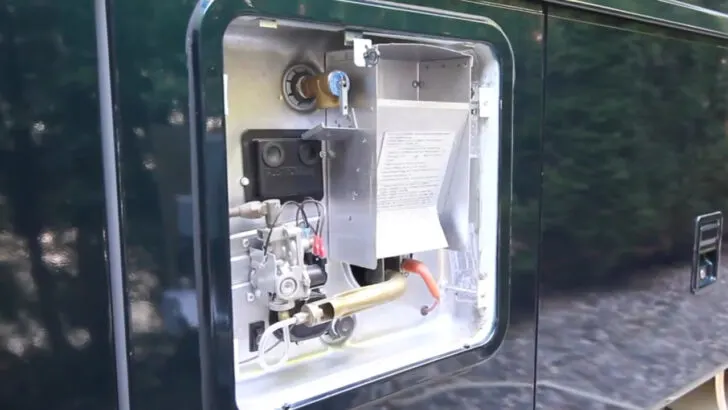
A traditional RV propane/electric water heater has a tank that most often holds between 6 and 10 gallons of water.
However, a tankless water heater (sometimes referred to as an “on-demand water heater”) doesn’t store water – there’s no tank or reservoir at all. When you “demand” hot water by turning on a faucet, water from either your fresh water tank (if you’re boondocking) or from your city water source (if you’re connected) passes through the water heater and is instantly heated as it does.
This means that the only limitation to how much hot water you can use is how much water you can access. So, if you’re boondocking, you’re likely to place some limitations on yourself so that you don’t drain your fresh water tank (or overfill your gray tank!). But if you’re connected to a city water source, (at a campground, for example, with a full hook-up), you have an endless supply of hot water (and a sewer connection for the gray to drain into).
That’s right – you won’t run out of hot water…unless you run out of water!
With an RV tankless water heater, then, hot water is not only instant (on demand), but also unlimited (or limited only by the amount of water you have).
How Does an RV Tankless Water Heater Work?
With a tankless water heater, water is heated either by diesel (in a hydronic heating system), propane (in smaller, dedicated water heaters), or by an electric heating element (not common in RVs, but often used in sticks-and-bricks houses). All you need to do is turn on a hot water tap anywhere in your RV – the shower, bathroom sink, kitchen sink, outdoor shower, etc – and you’ve made your “demand” for hot water.
Water is then heated nearly instantly and sent to the hot water tap that’s been opened.
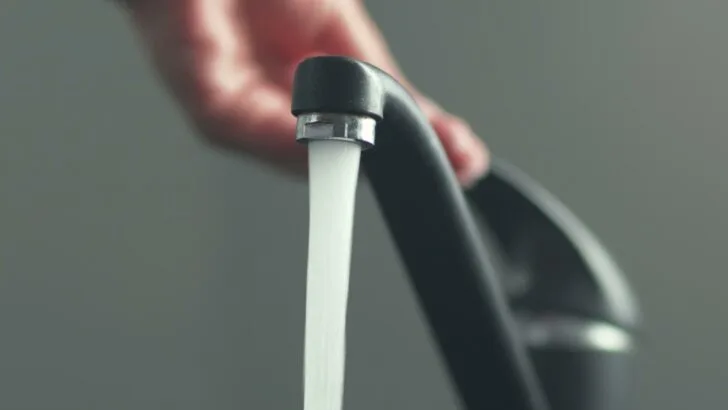
A tankless water heater is an on-demand water heater. You “demand” hot water by turning on the hot water tap and the water is heated instantly.
What Are the Benefits of an RV Tankless Water Heater?
Surely you’re already seeing a number of benefits of an RV tankless water heater. Let’s sort them out in brief detail.
More Efficient
First, tankless water heaters are more efficient. A tank of water isn’t being heated for 20 minutes or more before the hot water can be used. Also, with a traditional water heater, the entire tank full of water has to be heated, even if you only use a little bit, let’s say for washing the dishes.
By heating water instantly as it passes through the heater (but only on demand), a tankless water heater is much more efficient.
Any water heater that uses a tank is less efficient, not only in an RV but anywhere. In order to give you hot water on demand, the tank needs to constantly be heating to have that hot water ready when you ask for it. That’s inefficiency at its worst.
In an RV, you can of course shut off the water heater once it’s finished heating the tank, which can help to conserve power/propane. Because the tanks in standard water heaters are insulated, the water will stay hot/warm for quite a while. But it will slowly cool down if not re-heated… which means you could be in for a nasty surprise in the shower if you forgot to turn it back on in time.
Never Run Out of Hot Water
This is perhaps the most popular feature of a tankless water heater. Your access to hot water is only limited by your access to water. With a tankless water heater, you never run out of hot water – unless you run out of water (or the supply of fuel that’s used by the on-demand heater).
If you’re connected to a city water source, you could allow a family of six to shower one after the other and never run out of hot water. You could allow a football team to shower one after the other and never run out of hot water. You get the idea.
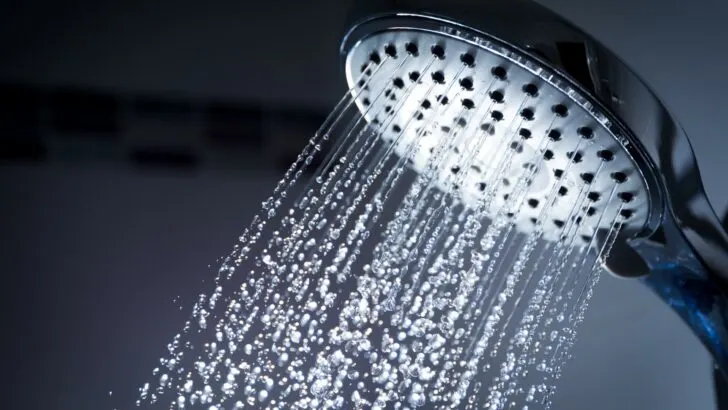
With a tankless water heater, you’ll never run out of hot water – unless you run out of water or the fuel or electricity that heats it.
No Waiting 20+ Minutes for Water to Heat
With a traditional RV water heater, once you turn on the switch calling for the water to start heating, you’ll have to wait at least 20 minutes for hot water. If you need hot water quickly for some reason, that’s not possible unless your water heater has already been on, heating the water for enough time.
With a tankless water heater, on-demand literally means ON DEMAND. You turn on the tap “demanding” hot water, and there it is. Almost instantaneously (you still need to run out the water that’s cooled in the line between the faucet and the water heater) you’ve got piping hot water flowing.
Can Use Less Fuel
Tankless water heaters can use less fuel (propane or diesel) because they only heat the water being used. Once again, if you heat the entire tank full of water and only use a gallon or two, then you turn off the water heater, you’ll use a lot of fuel to re-heat that tank full of water again the next time you need hot water.
If, on the other hand, you leave the water heater on, it will continue using propane/diesel/electric to keep the water in the tank hot all day.
A tankless water heater will only need fuel while it’s heating the water you’re using. Once you turn off the hot water tap, no more is used (until the next time you turn on the hot water tap).
Lightweight Because They Don’t Hold Water
When you have a traditional water heater with a tank in your RV, you’re always carrying around that amount of in the tank. If you have a 10-gallon RV water heater, that’s 83.4 pounds (8.34 pounds per gallon of water x 10) sitting in that area of your rig. And that’s just the water. Add another 20 pounds or so for the water heater itself, and you’re looking at 100 extra pounds of weight.
A tankless water heater, on the other hand, is – well – tankless. No tank, no water in the tank – so that’s 100 pounds less for you to carry around.
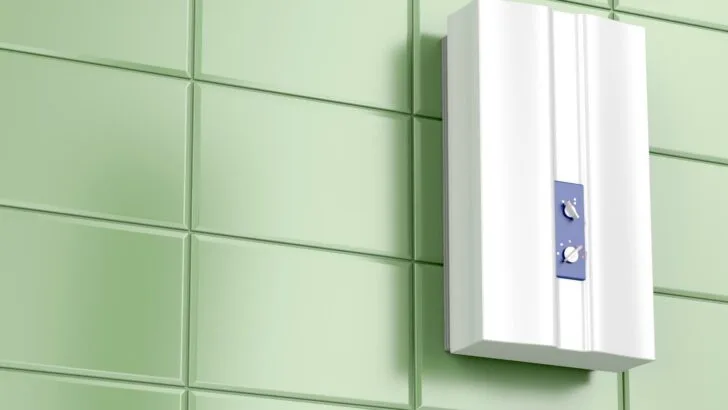
A tankless water heater doesn’t hold several gallons of water in a reservoir. There is no tank so there is no heavy container of water to be heated. Water is instead instantly heated as it passes through the tankless heater.
What Are the Downsides of an RV Tankless Water Heater?
There are a few downsides to consider where an RV tankless water heater is concerned.
More Expensive
First, they tend to be more expensive to buy and to install, the details depending on which model you choose. On average, however, they’re often only a couple hundred dollars more expensive, and you could save that much money in propane in fairly short order.
May Use More Water
With the gloriously long, hot shower comes the fact that overuse of water is not such a good thing. This is true from a couple of perspectives.
If you’re boondocking, you need to conserve your fresh water if you want to stay out for a while without having to refill your fresh water tank and dump your gray. The longer your showers are, the sooner you’ll have to break camp!
And if you’re connected to a city water source, extremely long showers are – dare we say it? – irresponsible. We’re not talking about a nice, comfortable shower during which you can shave, wash your hair, and let the hot water run on your aching back for a while. We’re talking excessively hot showers. Teenager-length hot showers. Let’s move on!
Can Freeze In Cold Temperatures Unless They Have Freeze Protection
If you camp in freezing or sub-freezing temperatures, tankless water heaters often require some sort of freeze protection, or they can freeze, potentially causing significant problems with the heater itself. It’s the nature of this kind of heater, where the water can pass through smaller plumbing lines, allowing it to freeze faster than one giant tank of water.
How Much Does an RV Tankless Water Heater Cost?
The average RV tankless water heater costs around $1,000-1300.
For reference, a standard 10-gallon RV water heater will cost around $800 or so.
How Do You Install An RV Tankless Water Heater?
We’re glad you asked! While we haven’t installed one ourselves, our friends Tom and Caitlin Morton (Mortons on the Move) had a Truma AquaGo On-Demand Tankless RV Water Heater installed and they’ve got the details for you right here:
In the case of the Truma, it has to be professionally installed. Other on-demand RV water heaters may be self-installed… but, honestly, because you’re talking about the risk of a fire or flood, we highly recommend considering having a professional do the install, even if you COULD install it yourself.
Is It Worth Switching to an RV Tankless Water Heater?
As always, this really depends on how you use your RV. There are many campers who prefer to use RV park and campground showers rather than shower inside their rig. This could be because they have a very small RV, or because showering is a real challenge in their type of RV, or because they have a very small hot water tank. For many of these campers, showering at the camping facility is their routine, and they’re perfectly happy with it. Installing a tankless water heater might not make sense for them.
There are also many people who don’t use their RVs all that frequently, and for them upgrading to a tankless water heater might not make sense either.
However, for a great many of us, an RV tankless water heater makes a fantastic upgrade. We don’t have a tankless water heater as yet, but the Mortons are happy to tell you why they love theirs in this post.
They also made a video a few months after having the Truma AquaGo installed, discussing their thoughts after using it for a few months. We’ll leave that video for you to enjoy right here:
Have a traditional RV water heater, but not getting any hot water out of it? Check out our posts RV Shower Getting Cold? RV Water Heater Troubleshooting Tips and No Hot Water in Your RV? Try This Simple Fix First!
Or, if you already have tankless water heater, but are having problems with it, check out our tankless RV water heater troubleshooting guide.
Geek Out With Us Every Week
Join our newsletter to learn about all things RV-related. Every week we offer free tips, tricks, product reviews, and more to our online community of RVers. So, whether this is your first time on the road or you’re a seasoned expert, we’d love for you to geek out with us!

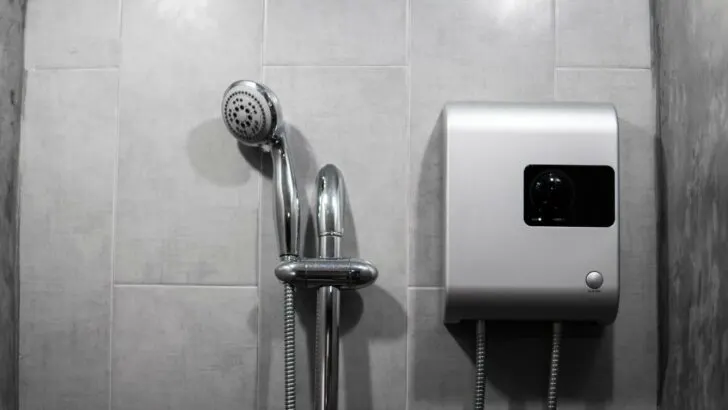
Mike
Saturday 25th of December 2021
One other downside is flow… when you call for hot water, the flow of water triggers the heat, meaning it has to be substantial enough to turn on heat . So if you do run the flow at called velocity, it won’t trigger the heat!!!
TheRVgeeks
Sunday 26th of December 2021
One of the things that’s so great about the Truma unit is that it senses water flow even at an extremely low rate. We can barely trickle the water, and it knows it’s running and keeps it hot!
Rick Dowling
Saturday 25th of December 2021
We bought our first tankless water heater for our sticks and bricks over almost 20 years ago and we loved it! So when we got our RV that was one of the first mods we made. We are very happy with the change! Thanks for the article guys and have a happy holiday!
TheRVgeeks
Sunday 26th of December 2021
Thanks so much Rick! Same to you and yours.